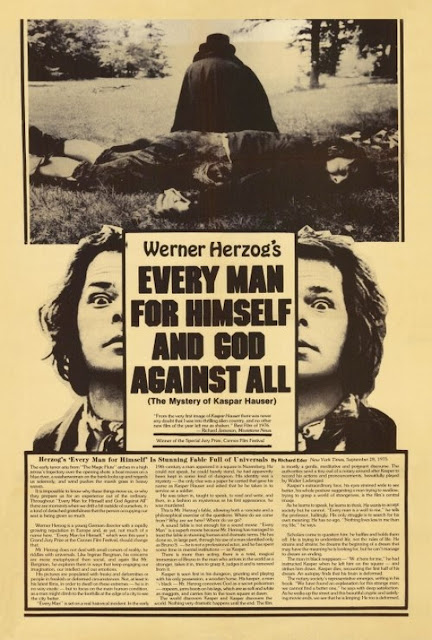"Kaspar's story is about what civilization does to us all, how it deforms and destroys us by bringing us into societal line; in Kaspar's case this stultifying and staid bourgeois existence. Kaspar was a young man who showed up in Nuremberg in 1828. When the people of the town attempted to communicate with him it transpired he had spent his whole life locked away in a dark dungeon tied to the ground with his belt. He had never had any contact with human beings because food was just pushed into his cell every night when he was sleeping. He never even knew of the existence of other human beings and even believed the belt which forced him to remain seated was a natural part of his anatomy. A couple of years after being taken in by the town, word got out that Kaspar was writing his autobiography. Soon after came the first attempt on his life, followed by his murder. It had been about two and a half years since he was found in the town square, and to this day no one is sure who his killer was. Kaspar was brutally propelled into the world as a young man who had not experienced society in any way whatsoever. It is the only known case in human history where an individual was 'born' as an adult. He arrived in society having completely missed his childhood and was forced to compress these years into only two and a half years. After this time Kaspar actually spoke quite well. He could write and even played the piano. For me this is the most interesting element to his story and the reason why The Enigma of Kaspar Hauser is not a historical film. It is on a completely separate level to classic historical drama, and the primary issue it deals with is timeless: the human condition. Who the boy really was is neither important nor interesting, and is something that we will probably never know for certain. My film does not deal only with the problems the townsfolk experience because Kaspar is living amongst them, but also with Kaspar's problems with the society in which he finds himself. There is a scene in the film when a young child holds a mirror up to Kaspar's face, the first time he has ever seen his reflection, something which confuses and shocks him. This is actually just what Kaspar is doing to everyone around him: forcing them to confront their day-to-day existence with new eyes."
-- Herzog, werner. 2002. Athletics and Aesthetics. In: Paul Cronin (ed.). Herzog on Herzog. Faber and Faber Limited. London. pp. 111-112.







ليست هناك تعليقات:
إرسال تعليق